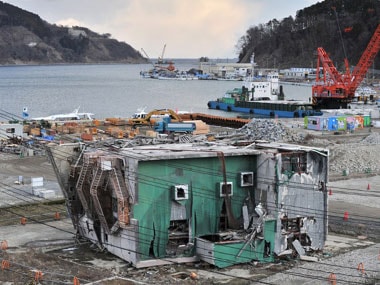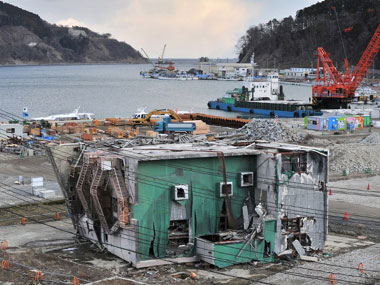Toni, Japan: When the tsunami smashed the seafood processing factory where Shoichi Sato was working, he lost his job but eventually found a new life. Three years later, Sato is among the businessmen helping to bring back the fishing industry, long a mainstay livelihood for coastal towns along Japan’s northeastern coast. Sato’s company, Kamaishi Hikari Foods, employs only 25 people but supports hundreds more who sell their catches of octopus, squid, salmon and mackerel for processing right at the water’s edge. In Toni, whose entire port was wrecked by the tsunami, it’s about the only game in town. Businesses throughout Japan’s northeastern Tohoku region face a reality TV show’s worth of obstacles to setting up shop, from shortages of financing and construction workers and materials, to lengthy delays in administrative approvals and overburdened transport networks. For Sato, it was the Qatar Fund Foundation and other groups that pitched in with funds to buy equipment and advice on how to best run his new business. [caption id=“attachment_1434459” align=“alignleft” width=“380”]  One of the fishing ports damaged in the tsunami. AFP.[/caption] Sitting in his second story office overlooking a wharf still being reconstructed, Sato said he got “zero” financial help from the government, which until recently wouldn’t approve subsidies for new businesses. Across the region, the government says nearly two-thirds of damaged land has been salvaged and 78 percent of fishery processing restarted. But for the majority, sales are well below pre-disaster levels. Most damaged stores and other businesses are operating from temporary quarters such as shipping containers and prefabricated huts. The regional economy was in trouble even before the March 11, 2011 earthquake and tsunami triggered a nuclear disaster that contaminated chunks of the coast with radiation. The 18,520 people dead or missing as a result of the natural disasters were remembered this week as Japan marked the third anniversary of the tsunami. Tens of thousands of people are in limbo following the meltdowns at the Fukushima Dai-Ichi nuclear plant, unsure if they ever will be able to resume farming, fishing or other businesses, or even return home. To the north, the seven biggest fish markets in Iwate and Miyagi, the two other prefectures that suffered massive damage from the tsunami, but not radiation, reported a combined catch of 303,629 tons in 2013, down from 444,894 tons in 2010, before the disaster but up from 169,786 in 2011. It took the prefectural, or state, government over a year to approve Sato’s tiny factory, which uses an innovative freezing process to package fish, seafood and seaweed for direct sales to a Tokyo supermarket and a sushi chain, his main customers. The process causes less damage to cells in the frozen food, improving quality when they are thawed for use in sushi and sashimi. In the northeastern Tohoku region, young workers tend to leave to seek work in bigger cities. Fishing pays poorly, costs are rising and there are few other jobs. At the same time, the jobs that do exist go begging: Sato employs three generations of women from one family, from the 63-year-old grandmother to the 18-year-old granddaughter. Some of his employees travel from homes far up the coast to get to work. As in much of the region, about half of Toni’s 1,800 residents are still living in temporary, prefabricated huts. Fed up with delays in resettlement in new homes on higher ground, many residents are leaving. “I need to be able to pay the fishermen more for their fish, or they won’t manage to stay in business. That’s apart from making any money here ourselves,” said Sato. Sato is keen to improve quality through innovations such as testing the salt content of his ice and water for optimal levels for freshness. He works with Japan Fisheries, the alliance of fishery cooperatives that oversees the industry, helped coordinate the transfer of seed oysters and seaweed beds to tsunami damaged areas, hurrying along the recovery process. Still, nearly a quarter of fishing-related businesses have closed since the tsunami. In Miyagi, only 18 of the 142 ports wiped out in the disaster have reopened. In the Miyagi port of Ogatsu, oyster farmer Hiromitsu Ito lost his home, his fishing boats, and his oyster beds, just after he had taken out a loan to begin oyster processing. Like Sato, he restarted from scratch. But Ito is innovating with an online business model. His customers pay a membership fee and can buy a share of the catch directly from Ito’s business. Ito and his business partners used funds from the membership fees to help fishermen get back up and running. They are also training newcomers like 23-year-old Yuuki Miura, a fisherman apprentice, hoping to keep the industry alive. “When I was small, I lived with my grandfather and I grew up watching him work,” said Miura. In a region whose population is fast declining and aging, time pressures are felt by all, said Ito, the oyster farmer. “This year is the real deal, it’s the make-it-or break-it year,” he said. AP
When the tsunami smashed the seafood processing factory where Shoichi Sato was working, he lost his job but eventually found a new life. Three years later, Sato is among the businessmen helping to bring back the fishing industry, long a mainstay livelihood for coastal towns along Japan’s northeastern coast.
Advertisement
End of Article
Written by FP Archives
see more


)

)
)
)
)
)
)
)
)



